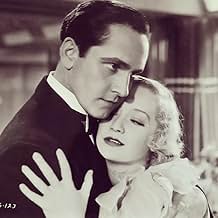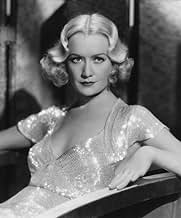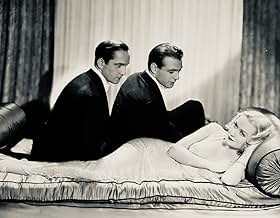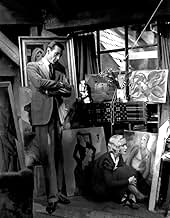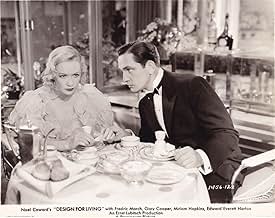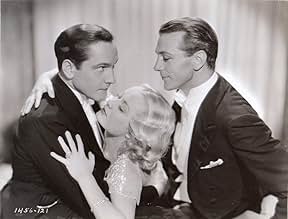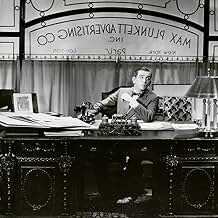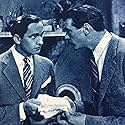AVALIAÇÃO DA IMDb
7,4/10
8,2 mil
SUA AVALIAÇÃO
Uma mulher não consegue decidir entre dois homens que são apaixonados por ela, e o trio concorda em tentar viver juntos em um amigável relacionamento platônico.Uma mulher não consegue decidir entre dois homens que são apaixonados por ela, e o trio concorda em tentar viver juntos em um amigável relacionamento platônico.Uma mulher não consegue decidir entre dois homens que são apaixonados por ela, e o trio concorda em tentar viver juntos em um amigável relacionamento platônico.
- Direção
- Roteiristas
- Artistas
- Prêmios
- 3 vitórias no total
Cosmo Kyrle Bellew
- Man
- (não creditado)
Lionel Belmore
- Theatre Patron
- (não creditado)
Thomas Braidon
- Douglas' Second Manager
- (não creditado)
Nora Cecil
- Tom's Secretary
- (não creditado)
Emile Chautard
- Train Conductor
- (não creditado)
Mathilde Comont
- Heavy Woman
- (não creditado)
Adrienne D'Ambricourt
- Cafe Proprietress
- (não creditado)
James Donlan
- Fat Man with Ring
- (não creditado)
Harry Dunkinson
- Mr. Egelbauer
- (não creditado)
Estelle Etterre
- Woman in audience
- (não creditado)
- Direção
- Roteiristas
- Elenco e equipe completos
- Produção, bilheteria e muito mais no IMDbPro
Avaliações em destaque
Intelligent script, witty dialogue, sexy stars, sophisticated story, deft direction…What more can I say? It's Lubitsch and Paramount at its Pre-Code best! This was another of those "vintage" films of which you had the chance of reading a lot about, but before Universal released "The Gary Cooper Collection", where it's included, you had nowhere to watch it. Of course, I bought promptly the aforementioned set.
The picture tells the story of free-spirited Gilda Farrell, a young lady who works at a Parisian Advertising Agency, managed by that great seasoned pro, Edward Everett Horton, who by chance meets on board a train, struggling, penniless, artists George Curtis, a painter (Gary Cooper) and Thomas Chambers, a playwright (Fredric March), in which may be one of the most "risqué" plots of all the Pre-Code Era, dealing openly with the pros and cons of a mènage-a-trois.
Miriam Hopkins portrays the deliciously mischievous Gilda, giving a top, tongue-in-cheek performance, looking absolutely beautiful and full of glow from within; it's really in her films directed by Lubitsch that her appeal shines at its most and she looks at her attractive-best.
Fredric March is good too as the "more down-to-earth-but-nevertheless-madly-in-love" playwright, who lives with buddy Gary Cooper in a miserable tenement, until Miriam Hopkins comes in scene and to "the rescue".
But the revelation, in my opinion, is Gary Cooper; after seeing him in many of his 1930s films, I feel that I like him best in the variety of roles he got to play in those years: a young idealist in "Peter Ibbetson", a sensitive soldier in "A Farewell to Arms", a sophisticated artist in this one, etc. He really was a good actor from the beginning of his "talkies" career (I haven't seen his Silents, so I cannot give an opinion), showing much skill and depth in his interpretations. In this film he plays excellently opposite such strong talents as Miriam Hopkins and Fredric March, absolutely "a la par".
In all, a highly enjoyable film. Smart Entertainment. A must.
The picture tells the story of free-spirited Gilda Farrell, a young lady who works at a Parisian Advertising Agency, managed by that great seasoned pro, Edward Everett Horton, who by chance meets on board a train, struggling, penniless, artists George Curtis, a painter (Gary Cooper) and Thomas Chambers, a playwright (Fredric March), in which may be one of the most "risqué" plots of all the Pre-Code Era, dealing openly with the pros and cons of a mènage-a-trois.
Miriam Hopkins portrays the deliciously mischievous Gilda, giving a top, tongue-in-cheek performance, looking absolutely beautiful and full of glow from within; it's really in her films directed by Lubitsch that her appeal shines at its most and she looks at her attractive-best.
Fredric March is good too as the "more down-to-earth-but-nevertheless-madly-in-love" playwright, who lives with buddy Gary Cooper in a miserable tenement, until Miriam Hopkins comes in scene and to "the rescue".
But the revelation, in my opinion, is Gary Cooper; after seeing him in many of his 1930s films, I feel that I like him best in the variety of roles he got to play in those years: a young idealist in "Peter Ibbetson", a sensitive soldier in "A Farewell to Arms", a sophisticated artist in this one, etc. He really was a good actor from the beginning of his "talkies" career (I haven't seen his Silents, so I cannot give an opinion), showing much skill and depth in his interpretations. In this film he plays excellently opposite such strong talents as Miriam Hopkins and Fredric March, absolutely "a la par".
In all, a highly enjoyable film. Smart Entertainment. A must.
I'm not a big fan of the Lubitsch Touch. This, which I hadn't seen in 20 years, I think is my favorite.
The recent Broadway revival of the Noel Coward play, which was supposedly very ooh-la-la and daring, was a bust. Interminable and misguided.
One problem was that the female lead was made very cold. In the movie, Miriam Hopkins is just right: pretty, seductive, witty.
Gary Cooper is sublime. He was a great comedian -- equally good in "Desire," the delightful movie with Dietrich that Lubitsch produced and supposedly had a big hand in directing. Too bad he changed gears so drastically and became the strong, silent Western hero he's known for today (if he's known at all, alas.)
Fredric March was a very fine actor but not a comedian. He is the weakest link; but he works well in the ensemble.
Edward Everett Horton is funny, as always.
It really works, and is as racy today as it must have been when it came out.
The recent Broadway revival of the Noel Coward play, which was supposedly very ooh-la-la and daring, was a bust. Interminable and misguided.
One problem was that the female lead was made very cold. In the movie, Miriam Hopkins is just right: pretty, seductive, witty.
Gary Cooper is sublime. He was a great comedian -- equally good in "Desire," the delightful movie with Dietrich that Lubitsch produced and supposedly had a big hand in directing. Too bad he changed gears so drastically and became the strong, silent Western hero he's known for today (if he's known at all, alas.)
Fredric March was a very fine actor but not a comedian. He is the weakest link; but he works well in the ensemble.
Edward Everett Horton is funny, as always.
It really works, and is as racy today as it must have been when it came out.
10reelguy2
Miriam Hopkins finds herself in love with both Gary Cooper and Fredric March (who can blame her?), so she does what any sensible Pre-Code woman would do: she decides to live with both of them!
It's a tribute to movie audiences of the early 1930s that a sophisticated comedy like Design for Living could a.) Get produced, and b.) Be a success at the box office. The dumbing down of current films means that the delicious innuendo in Design for Living would go over the head of most of today's audience.
The key to the Lubitsch Touch was in the perfect timing of physical gestures and the delivery of the lines. Trouble in Paradise and Design for Living were the best in this respect. Personally, I prefer the lack of music in Design for Living. I think it dates the film less than Lubitsch's other efforts.
I don't mind that Ben Hecht wrote most of the film's dialog rather than Noel Coward, who wrote the original play. All I know is that the dialog is very very funny and quite naughty, making this the ultimate Pre-Code film.
Miriam Hopkins could do no wrong in a Lubitsch film, and her work here is brilliant. She's intelligent and uncompromisingly honest. Her leading men, Gary Cooper and Fredric March, are both sexy and hilarious. Gary Cooper is a particular revelation, displaying a flair for comedy that is quite unexpected. As Cooper's friend and rival for the affection of Hopkins, March is also very funny, which comes as no surprise after his brilliant parody of John Barrymore in The Royal Family of Broadway (1930).
Prepare to laugh yourself silly during what may be the funniest film ever made.
It's a tribute to movie audiences of the early 1930s that a sophisticated comedy like Design for Living could a.) Get produced, and b.) Be a success at the box office. The dumbing down of current films means that the delicious innuendo in Design for Living would go over the head of most of today's audience.
The key to the Lubitsch Touch was in the perfect timing of physical gestures and the delivery of the lines. Trouble in Paradise and Design for Living were the best in this respect. Personally, I prefer the lack of music in Design for Living. I think it dates the film less than Lubitsch's other efforts.
I don't mind that Ben Hecht wrote most of the film's dialog rather than Noel Coward, who wrote the original play. All I know is that the dialog is very very funny and quite naughty, making this the ultimate Pre-Code film.
Miriam Hopkins could do no wrong in a Lubitsch film, and her work here is brilliant. She's intelligent and uncompromisingly honest. Her leading men, Gary Cooper and Fredric March, are both sexy and hilarious. Gary Cooper is a particular revelation, displaying a flair for comedy that is quite unexpected. As Cooper's friend and rival for the affection of Hopkins, March is also very funny, which comes as no surprise after his brilliant parody of John Barrymore in The Royal Family of Broadway (1930).
Prepare to laugh yourself silly during what may be the funniest film ever made.
In this surprisingly risqué film made before the Hays code, two men and a woman share an apartment in Paris and talk openly about sex. It's fun to watch, thanks to the witty and sophisticated dialog of Noel Coward, the screenplay by Ben Hecht, and of course the masterful direction of Lubitsch. March is wonderful as a struggling playwright. Hopkins has one of her best roles as a free-loving woman who loves two men but marries a third. Lubitsch elicits a fine comedic performance from Cooper as a hot-tempered artist. In a typical role, Horton plays a stuffed shirt. There's no music, which could make things seem static, but Lubitsch keeps it moving at a breezy pace.
Delightful even if more Ben Hecht than Noel Coward. The "menage a trois" has real brains, wit and magic. All due to the sensational chemistry between Gary Cooper, Fredric March, Miriam Hopkins and, of course, the unmistakable Lubitch touch. I was going to say that the film seems written today but the sad truth is there is nobody today that could write with this extraordinary elegance. Frediric March is masculine and volcanic, Gary Cooper feminine and irresistible and Miriam Hopkins, a sensational modern comedienne. As if this wasn't enough, Edward Everett Horton as Mr Wrong. The scene in which Hopkins compares Cooper and March to hats is one of my all time favorites.
Você sabia?
- CuriosidadesConsiderable censorship difficulties arose because of sexual discussions and innuendos, although the Hays Office eventually approved the film for release. However, the film was banned by the Legion of Decency and was refused a certificate for re-release by censor Joseph Breen in 1934 when the Production Code was more rigorously enforced.
- Erros de gravaçãoCamera shadow visible on window frame as Gilda sets the table.
- Citações
Max Plunkett: Immorality may be fun, but it isn't fun enough to take the place of one hundred percent virtue and three square meals a day.
- ConexõesFeatured in Complicated Women (2003)
- Trilhas sonorasThe Star Spangled Banner
(1814) (uncredited)
Music by John Stafford Smith
Hummed by Gary Cooper and Fredric March
Principais escolhas
Faça login para avaliar e ver a lista de recomendações personalizadas
Detalhes
- Data de lançamento
- País de origem
- Idiomas
- Também conhecido como
- Design for Living
- Locações de filme
- Empresa de produção
- Consulte mais créditos da empresa na IMDbPro
Bilheteria
- Faturamento bruto mundial
- US$ 157
- Tempo de duração1 hora 31 minutos
- Cor
- Proporção
- 1.33 : 1
Contribua para esta página
Sugerir uma alteração ou adicionar conteúdo ausente

Principal brecha
By what name was Sócios no Amor (1933) officially released in India in English?
Responda

